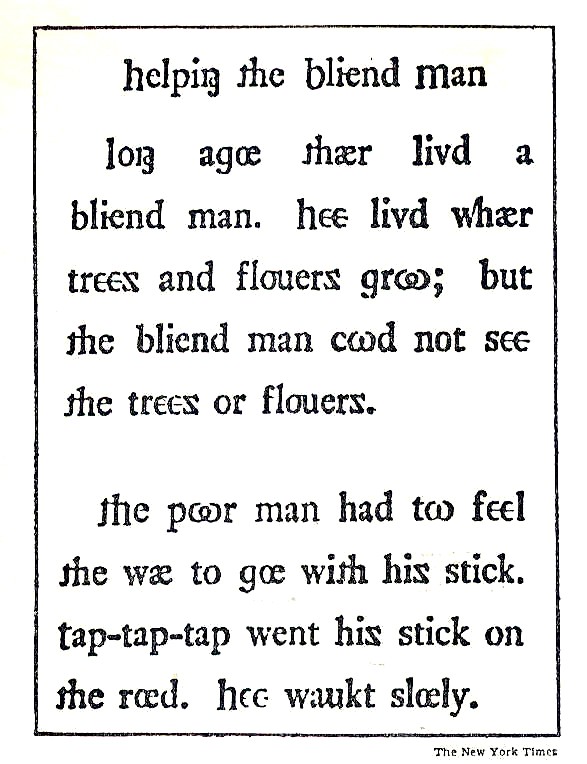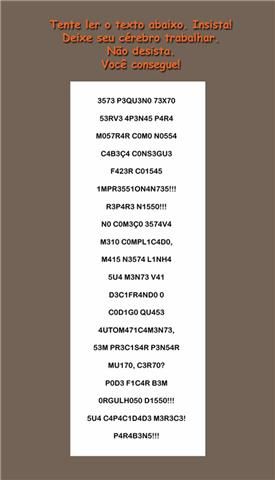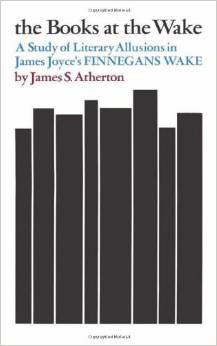Finnegans Jargon
Before we go into that, we should take a look on something Joyce does that confuses the subject.
Marshall McLuhan most appropriately, when discussing the subject, proposed the following to make the point I want to do here:


To which I added something similar, but written obscurely in my language, Portuguese.
In the firs figure it is written, almost obviously the following:
Helping the blind man
long ago there lived a
blind man. he lived where
trees and flowers grew. but
the blind man could not see
the trees or flowers.
The poor man had to feel
the way to go with his stick
tap-tap-tap went his stick on
the road. He walked solely
In the second figure it is written?
Tente ler o texto abaixo. Insista!
Deixe seu cérebro trabalhar
Não desista.
Você consegue!
which means in English:
Try reading the text below. Insist!
Let your brain work
Do not give up.
you can do it!
And the text in Portugues means: (with English translation in red:
Este pequeno exemplo This
small example
serve apenas para only serves to
mostrar como nossa show how our
cabeça consegue head can
fazer coisas do things
impressionantes!!! Awesome !!!
Repare nisto Notice it
No começo parecia At first it seemed
muito complicado very complicated
mas nesta linha but this line
sua mente vai your mind will be
decifrando o deciphering the
código quase code almost
automaticamente automatically
sem precisar pensar without thinking
muito. Você much. You
pode ficar bem can be very
orgulhoso disto!!! proud of it!!!
Sua capacidade merece Your ability deserves
Parabéns! congratulations!
The mixing is intentional because
of the following history:
 The
Books at the Wake: A Study of Literary Allusions in James Joyce's Finnegans
Wake
The
Books at the Wake: A Study of Literary Allusions in James Joyce's Finnegans
Wake
Page 15: "Come in"
An anecdote given by Richard Ellmann shows Joyce's unusual attitude: "Becket was staking dictation from Joyce for Finnegans Wake; there was a knock on the door and Joyce said, "Come in". Beckett, who hadn't heard the knock, by mistake wrote down "Come in" as part of the dictated text. Afterwards he read it back to Joyce who said, "What's that 'Come in'? "That`s what you dictated," Beckett replied. Joyce thought for a moment realizing that Beckett hadn`t heard the knock; then he said, "Let it stand". The very fact that the misunderstanding had occurred in actuality gave it prestige for Joyce.' This incident shows - I think - rather more than Kerner suggests, Joyce was not in his own opinion simply writing a book, he was also performing a work of magic.
What about how many languages Joyce knew, and how many there are and in which proportion at Finnegans?
When I take a look at such fine books such as this one above, or the magnificent work A Classical Lexicon for Finnegans Wake: A Glossary of the Greek and Latin in the Major Works of Joyce, Including Finnegans Wake, the Poems, Dubliners, specially Finnegans list, and other lexicon in German A Lexicon of the German in Finnegans Wake – September, 1984 by Helmut Bonheim (Author) I wonder why, with so much computer power to explore texts, people insists on the "70 languages" Joyce used in Finnegans".
The language is unmistakably English which, as we know, drew heavily from Latin.
The Classical Lexicon in Latin above has 500 pages and the one in German 176.
French, Italian, Spanish, to name the major occidental cultures languages do not have a study such as those for German and Latin because it would be simply too small...As matter of fact what you will find is a small glossary at the end of their translation.
Incidentaly there is a study as such for "small languages":
A Lexicon of “Small” Languages in Finnegans Wake edited by C. George Sandulescu. This book informs that Joyce himself admited having used 40 languages, and the book iteself is concerned with 19 "minor" languages. 236 pages.
This same author also published A Lexicon of Common Scandinavian in Finnegans Wake 195 pages.
He also edited A Lexicon of Romanian in Finnegans Wake 74 pages.
It is much more a case of idioglossia than anything else.